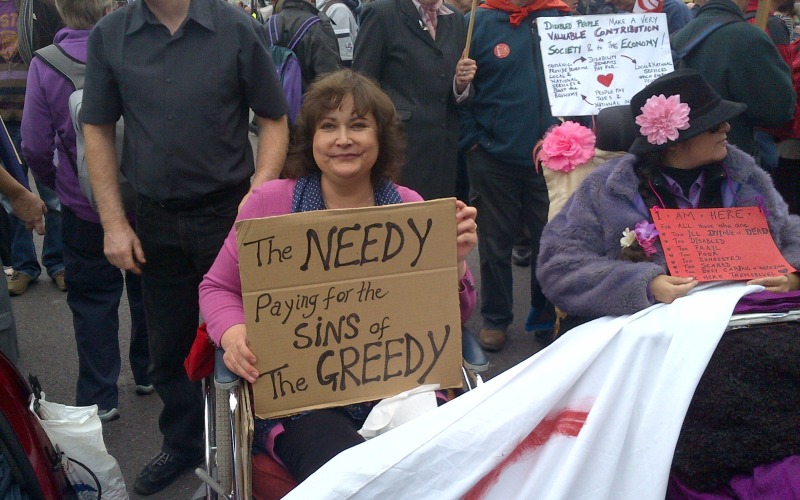Disabled people are becoming increasingly excluded in many areas of their lives and are in danger of becoming “trapped in disadvantage”, a major report by the equality and human rights watchdog has concluded.
The Equality and Human Rights Commission (EHRC) says the inequality faced by disabled people is at risk of becoming “entrenched for generations to come” and has today (Thursday) called on the government to adopt “an acute focus on improving life in Britain for disabled people”.
More than a third of disabled people (36.8 per cent) experience “severe material deprivation*”, says the report, nearly three times that of non-disabled people.
It concludes: “The gaps between disabled people and non-disabled people are widening in many areas and disabled people are frequently falling behind other groups.”
Is Britain Fairer? has evaluated progress on equality and human rights across Britain over the last three years, covering education, health, living standards, justice and personal security, work, and participation in politics and public and community life.
The report concludes that disabled people are more likely to live in poverty than non-disabled people, are at greater risk of homelessness, and are among those worst effected by the social security reforms introduced by successive Conservative-led governments since 2010.
The report adds: “Those who can’t work rely on an increasingly restricted welfare regime that is projected to lower their living standards even further.
“They also face poorer health and lack of access to suitable housing.
“Safety is another major concern, as fewer disabled people have confidence that the criminal justice system is effective.
“Without the fundamental building blocks of good education, an adequate standard of living, and being safe and healthy, disabled people are often unable to participate fully in society.”
The report makes it clear that disabled people are “not enjoying the progress experienced by other groups”.
It adds: “Their right to an inclusive education is not being fulfilled – in fact, the proportion of disabled children at special rather than mainstream schools has increased in England and Wales – and they are more likely to be excluded from school.”
This disadvantage continues in later life, the report says.
It points out that an EHRC inquiry which reported in May into the accessible housing crisis found that disabled people across Britain were “demoralised and frustrated by the housing system, reporting a severe shortage of accessible houses across all tenures”.
Social care provision is “limited by funding shortfalls”, the report adds, with parliamentary inquiries concluding that many councils in England “have reduced the care available to the minimum required”.
The report also says that the life expectancy of people with learning difficulties is 14 years shorter (for men) and 18 years shorter (for women) than the general population, because of healthcare-related issues.
Among its many recommendations, the report calls on the government to: set out steps that will ensure disabled children have better access to mainstream education; impose new requirements to ensure new homes are built to stricter accessibility standards; and promote the accessibility of the justice system.
*“Severe material deprivation” is measured by the percentage of people surveyed who say they cannot afford four out of nine essential items
A note from the editor:
Please consider making a voluntary financial contribution to support the work of DNS and allow it to continue producing independent, carefully-researched news stories that focus on the lives and rights of disabled people and their user-led organisations.
Please do not contribute if you cannot afford to do so, and please note that DNS is not a charity. It is run and owned by disabled journalist John Pring and has been from its launch in April 2009.
Thank you for anything you can do to support the work of DNS…

 New disability minister pledges to put disabled people’s voices at heart of government’s work
New disability minister pledges to put disabled people’s voices at heart of government’s work Human rights watchdog ‘neutered’ by years of Tory appointments, say activists
Human rights watchdog ‘neutered’ by years of Tory appointments, say activists Disabled people’s organisations call on government to ‘show you will be on our side’
Disabled people’s organisations call on government to ‘show you will be on our side’